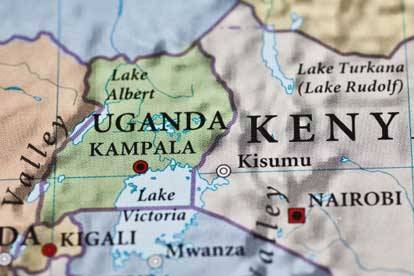 A freelance journalist was shot by Ugandan soldiers on February 18, the day of parliamentary and presidential elections. Soldiers shot and injured Julius Odeke near Bugusege, eastern Uganda.
A freelance journalist was shot by Ugandan soldiers on February 18, the day of parliamentary and presidential elections. Soldiers shot and injured Julius Odeke near Bugusege, eastern Uganda.
Shot by soldiers
Forces driving armored vehicles stopped four cars belonging to incumbent MP Nathan Mafabi, dragged Odeke out of the car, and shot him in the side, he told Committee to Protect Journalists (CPJ).
He had been covering election violence between supporters of Mafabi and the ruling party candidate, Beatrice Wabudeya. The freelance reporter had taken photographs of soldiers attacking Mafabi and his supporters in the hotly contested Buradiri West constituency before soldiers stopped the cars. Odeke lost his camera and cell phone in the attack.
Odeke, who contributes to the Chinese newswire Xinhua and a new Ugandan tabloid, The Razor, was quickly rushed to Mbale Referral Hospital for treatment. After soldiers sought him out at the hospital, Odeke moved to another medical center for security, Stephen Ouma, told general-secretary of the Ugandan Journalists Union. The union coordinated assistance for Odeke, who is now recovering, Ouma said.
Criminal Investigations Department Chief Edward Ochom said the violence during the Budadiri West polling is being investigated.
A heavy deployment of military and police patrolled the area near Bugusege after Wabudeya announced her decision to run against Mafabi two months ago, the Daily Monitor reported. Four other victims of the shooting attack later died, The Razor reported. Mafabi won the vote, according to local news reports.
6 journalists attacked
A few days later six journalists were brutally attacked on 23 February during local elections in the capital, Kampala.
Men believed to be supporters of the ruling National Resistance Movement (NRM) party mayoral candidate for Kampala, attacked journalists covering the mayoral elections at the Kakeeka polling station in the capital, local journalists told CPJ.
Wielding stones and sticks with nails, a mob attacked the journalists when they attempted to cover ruling party candidate Peter Ssematimba casting his vote at the Kakeeka polling station. The mob exited the station and disrupted voters and targeted journalists, said local reporters.
The men ordered journalists to stop taking pictures. Local journalists said they suspected the mob disrupted the polling process to prevent the public from witnessing alleged ballot-stuffing with pre-ticked ballots favoring Ssematimba’s candidacy. The mob quickly overpowered the small group of police patrolling the polling station.
Private radio station Metro FM filed a statement with the police after one of its reporters was attacked. Metro FM Director Brasio Zambale told that police spokeswoman Judith Nabakooka said there would be an investigation into the violence.
Voting irregularities at several polling stations
Voting irregularities in local elections for district chairman and mayors were witnessed at several of the polling stations – including higher vote counts at polling stations than registered voters.
The mob attacked two journalists working for the vernacular-language station Bukedde FM, Lydia Nabazziwa and Florence Nabukeera. Nabazziwa sustained a serious injury to her ear and received treatment at Kololo Hospital while Nabukeera developed a clot in her arm and was treated at Rubaga Hospital, told Bukedde FM News Editor Jude Matovu.
The two reporters were providing live coverage of the violence at the Kakeeka polling station and were direct targets of the mob, Matovu added.
Two journalists at the Christian television station Channel 44 TV were admitted to Mengo Hospital for treatment, the Human Rights Journalist Network of Uganda reported.
Reporter Brian Nsimbe sustained an arm injury and cameraman Nixon Bbaale was cut on his head. The journalists were later discharged, local journalists told CPJ. Uganda Broadcasting Corporation TV senior reporter Jane Anyango was cut on the face and bruised and received treatment at Mayor Clinic.
Christine Namatumbwe, a reporter and news anchor for Metro FM sustained injuries to her arm, and her cell phone and handbag were stolen during the attack, station director Zambale. Namatumbwe received treatment at Rubaga Hospital and was discharged the s

Opposition leader Kizza Besigye displays pre-marked ballot papers during a news conference Kampala.
ame day, he said.
Attacks – regular feature during elections
Uganda held presidential and parliamentary elections on February 18. Incumbent President Yoweri Museveni won the vote. The elections were held in a rough climate, with the opposition crying fraud and the army getting engaged.
Reports of voter intimidation, attacks on the opposition, journalists and electoral fraud are a regular feature during election time in Uganda.
In the beginning of February three main opposition candidates for the presidency publicly accused President Museveni of manipulating the Electoral Commission to rig the votes and training militias in every district to intimidate the electorate.
According to CPJ, one journalist was killed in Uganda in 2010. On 11 September 2010 freelance journalist Paul Kiggundu, 32, was beat by motorcycle taxi drivers while he was filming them demolishing a house in a town outside Kalisizio in southwest Uganda. He died of internal bleeding. He worked for TOP Radio and TV.
Related articles:
East and Horn of Africa – the most dangerous region for journalists
The freedom of press in East and Horn of Africa remains worst in the world





